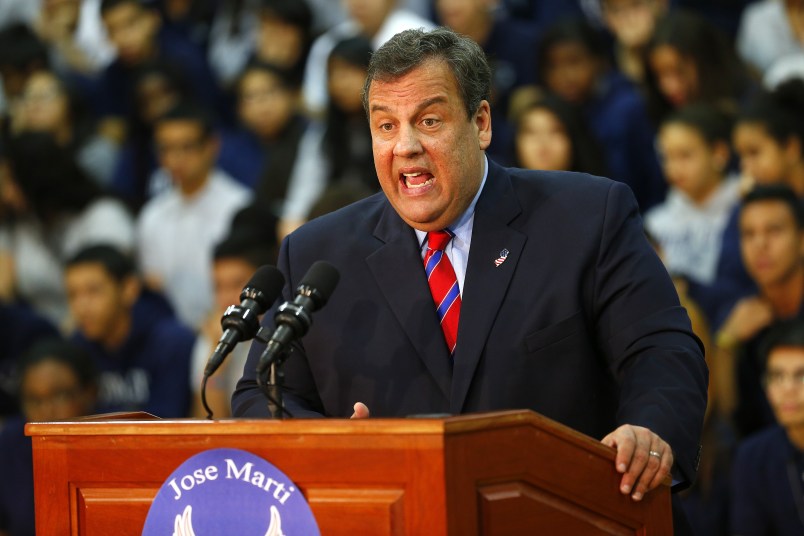As I discussed in my last TPMCafe column, a powerful meme is developing in Washington that interprets the recent behavior of congressional Republicans as evidencing a “civil war” against conservative radicalism, pointing to the revival of a “pragmatic” GOP that will be ready to govern come 2016. Such prophecies typically foresee the presidential nomination of a Chris Christie or a Jeb Bush to lead the triumphal Return to the Center of the pachyderms. After all, even in their period of wild reaction to Barack Obama, didn’t GOPers nominate “moderates” John McCain and Mitt Romney?
Well, yes, but media image aside, McCain and Romney certainly didn’t campaign for the GOP nomination as “moderates.” And more to the immediate point, both men benefited from a demolition derby that killed off a crowded (and not terribly impressive) field of hyper-conservative rivals. Romney himself illustrated the dynamic in both cycles. Running as the candidate of National Review and Jim DeMint in ’08, Romney was upset by Mike Huckabee in Iowa and squeezed out of a win in South Carolina by Huckabee and Fred Thompson. Meanwhile, after the predictable early collapse of Rudy Giuliani, McCain had the center of the party to himself and won the nomination with a string of plurality wins. In ’12, Romney’s only rival not projecting a ferocious “true conservatism” was the first candidate to withdraw, Tim Pawlenty.
Looking ahead to 2016, hard-core conservatives who don’t want a similar scenario leading to the nomination of Chris Christie or Jeb Bush will try very hard to unite early around a champion, presumably in Iowa. But it won’t be easy. Potential candidates Huckabee (the ’08 Iowa winner) Santorum (the ’12 winner) and Perry have campaigned there before; Paul Ryan and Scott Walker are from next-door Wisconsin, and the latter seems to have the tacit support of IA Gov. Terry Branstad; the Paul family’s “liberty” forces currently control the state party apparatus; and Ted Cruz has been greeted rapturously by conservative activists—especially Christian Right types—in a couple of visits. Indeed, the battle over the Iowa state party has led some observers to talk of Cruz as a “unity candidate” insofar as he could appeal to both Paulites and their bitterest conservative enemies.
It’s less uncertain that the “moderate” candidate field will be uncrowded. Part of the luck that blessed Mitt Romney in 2012 up until the time of his nomination is that a host of potential candidates who did not publicly flirt with birthers or fret about Shariah Law or talk up “state’s rights” chose not to run, notably Mitch Daniels, Haley Barbour and Jeb Bush, all putative “Establishment Saviors” at one point or another in the cycle. Yes, Huckabee’s still good at putting a smiley face on hard-right policy positions, but other than him, those mistrusted by “constitutional conservatives” are pretty much limited to Christie and Bush.
Assuming Ted Cruz continues to terrify “Establishment Republicans” and swing voters, and Rand Paul cannot progress much further in dekookifying his father’s ideological legacy, the conservative “unity candidates” that look most formidable are Paul Ryan and Scott Walker. With a national campaign behind him, and now a budget deal that has rebuilt his Beltway stock considerably, Ryan continues to combine an appearance of wonky sincerity with the ability to convince conservative activists he’s still an Ayn Rand disciple at hart. Aside from his all-purpose ideological soundness, Walker brings the ruthless Cromwell-like intensity of a politicized conservative evangelical to the emotionally satisfying projects of destroying unions and ratcheting down the social safety net.
With the exception of the perpetually cash-strapped Huckabee and Santorum, all the major aspirants for 2016 conservative unity candidate should have the resources to run a durable presidential campaign, particularly if the 2012 model of richly endowed candidate-aligned Super-PACs continues. Indeed, perhaps the big thing to watch during the “invisible primary” is where this cycle’s Sheldon Adelsons and Foster Friesses place large candidate bets.
And if the right can’t unite around a particular candidate (the last to achieve universal “movement” support was, somewhat ironically, George W. Bush in 2000), Plan B is to do to Christie and Bush what they did to McCain in 2008 and Romney in 2012: bind them with litmus tests and policy commitments that make them less dangerous to movement conservatism as a nominee and as a president. Any pretensions to “moderation” Mitt Romney had left in 2012 expired with his initials on Jim DeMint’s Cut, Cap and Balance Pledge (which involved permanent limitations on federal spending read right into the Constitution) and his endorsement of the Ryan Budget (underlined by his choice of Ryan as a running-mate).
This sort of maneuver can turn an apparent intraparty “civil war” into a mere general election audition. But at this point the right’s probably looking to take no chances and find a genuine champion.
Ed Kilgore is the principal blogger for Washington Monthly’s Political Animal blog, Managing Editor of The Democratic Strategist, and a Senior Fellow at theProgressive Policy Institute. Earlier he worked for three governors and a U.S. Senator. He can be followed on Twitter at @ed_kilgore.






